
Biotechnology for Biofuels
metrics 2024
Exploring the intersection of microbiology and renewable energy.
Introduction
Biotechnology for Biofuels, published by BMC in the United Kingdom, stands at the forefront of renewable energy research. As an open-access journal since 2008, it has become a critical platform for sharing innovative research and developments in the field of applied microbiology and biotechnology, particularly in the sustainable production of biofuels. With an impressive 2023 ranking of Q1 in multiple categories—including Applied Microbiology and Biotechnology, Biotechnology, and Management, Monitoring, Policy and Law—this journal offers unparalleled visibility and accessibility for your work. Its Scopus metrics underscore its influence, with rankings in the top 10% across several categories, emphasizing its integral role in advancing research on environmental sustainability and bioenergy solutions. Researchers, professionals, and students alike will find in this journal a rich resource for current studies, methodologies, and policies essential for navigating the complex landscape of biofuel technology.
Metrics 2024
 -
- 6.10
6.10 6.00
6.00 -
-Metrics History
Rank 2024
IF (Web Of Science)
JCI (Web Of Science)
Quartile History
Similar Journals

BIOTECHNOLOGY AND BIOPROCESS ENGINEERING
Transforming Ideas into Bioprocess BreakthroughsBIOTECHNOLOGY AND BIOPROCESS ENGINEERING, published by the Korean Society for Biotechnology and Bioengineering, is a prominent journal in the fields of applied microbiology, biotechnology, bioengineering, and biomedical engineering. Since its inception in 1996, this journal has served as a vital platform for researchers and professionals, facilitating the dissemination of cutting-edge research and innovative applications related to bioprocesses and biotechnology systems. With an ISSN of 1226-8372, this journal is ranked within the Q3 quartile across several categories, demonstrating its relevance and impact in the academic community. Although it operates under traditional access modalities, the journal strives to provide quality and timely insights into the advancements in bioprocess technology and microbial applications, fostering a collaborative environment for knowledge exchange. Notably, it is indexed with a respectable presence on Scopus, making it a valuable resource for students and professionals seeking the latest developments in biotechnology. For more details, kindly refer to the Korean Science Technology Center, #704 Yeoksam-Dong, Gangnam-Ku, Seoul 135-703, South Korea.
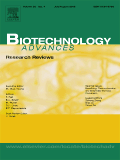
BIOTECHNOLOGY ADVANCES
Transforming Knowledge into Biotechnological AdvancesBIOTECHNOLOGY ADVANCES is a premier, peer-reviewed journal published by PERGAMON-ELSEVIER SCIENCE LTD, dedicated to advancing knowledge in the rapidly evolving fields of biotechnology and bioengineering. With an ISSN of 0734-9750 and an E-ISSN of 1873-1899, this esteemed journal covers a wide spectrum of topics relevant to applied microbiology, molecular biology, and biochemical innovation. Recognized for its academic rigor, it holds a distinguished position in the top quartile (Q1) in multiple categories, including Applied Microbiology and Biotechnology, Bioengineering, and Biotechnology, further evidenced by its high rankings in Scopus, where it ranks #3/127 in Applied Microbiology and Biotechnology and #7/311 in Biotechnology. Researchers and professionals in the field value the journal not only for its comprehensive coverage of cutting-edge research but also for its commitment to disseminating critical findings and fostering collaboration. While BIOTECHNOLOGY ADVANCES currently operates under a subscription model, its potential impact on future innovations in biotechnology cannot be overstated, making it an essential resource for anyone interested in the forefront of biotechnological advancements.
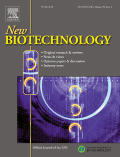
New Biotechnology
Illuminating the Path to Biotechnological ExcellenceNew Biotechnology, published by Elsevier, is a distinguished academic journal focused on the innovative realms of biotechnology and bioengineering. With an impact factor reflecting its strong presence in the field, this journal serves as a vital resource for researchers and professionals in the life sciences, offering insights into cutting-edge advancements and applications in biotechnology, molecular biology, and related disciplines. The journal's open access policy enhances its accessibility, allowing broad dissemination of knowledge and research findings. With a robust set of Scopus ranks placing it in the top tiers of its categories, including rank #36 in Biotechnology and #24 in Bioengineering, New Biotechnology represents a critical platform for scholars aiming to contribute to the ongoing dialogue in these rapidly evolving fields. Since its inception in 2008 and continuing through to 2024, the journal remains committed to fostering innovation and collaboration among scientists dedicated to advancing biotechnological applications, thereby significantly impacting medicine and industry.

APPLIED MICROBIOLOGY AND BIOTECHNOLOGY
Bridging science and application for health and sustainability.Applied Microbiology and Biotechnology, an esteemed journal published by Springer, serves as a vital resource in the domains of microbiology and biotechnology. With an impressive impact factor reflecting its quality, the journal holds Q1 rankings in various categories including Applied Microbiology and Biotechnology, Biotechnology, and Medicine (Miscellaneous) as of 2023. Spanning the years from 1984 to 2024, it underscores its commitment to disseminating groundbreaking research that addresses pressing challenges in health, agriculture, and environmental sustainability. The journal is rigorously indexed and holds respectable positions in Scopus rankings, notably within the top 15% of Applied Microbiology and Biotechnology and the top 15% in Biochemistry, Genetics, and Molecular Biology. Although it is not Open Access, its comprehensive articles, reviews, and short communications are indispensable for researchers, professionals, and students eager to advance their understanding and application of microbial processes and biotechnological innovations in real-world contexts.
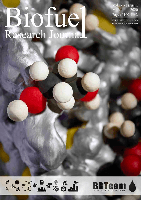
Biofuel Research Journal-BRJ
Transforming energy challenges into sustainable solutions.Biofuel Research Journal (BRJ) is a premier open-access publication that has been at the forefront of advancing knowledge in the field of biofuels since its inception in 2014. Published by Alpha Creation Enterprise in Malaysia, BRJ disseminates high-quality research that spans multiple disciplines, including Biotechnology, Chemical Engineering, and Environmental Science. With an impressive Q1 ranking across various categories in 2023 and a robust Scopus ranking positioning it among the top journals in its field, BRJ is dedicated to promoting innovative solutions that address contemporary energy challenges. The journal serves as a vital resource for researchers, professionals, and students engaged in sustainable energy, offering a platform for sharing cutting-edge findings and fostering interdisciplinary collaboration. With its commitment to open access, BRJ ensures that its content is widely available, supporting the global pursuit of renewable energy and environmental stewardship.
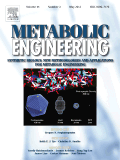
METABOLIC ENGINEERING
Unlocking the Potential of Metabolic EngineeringMETABOLIC ENGINEERING, published by Academic Press Inc. Elsevier Science, is a renowned journal in the fields of Applied Microbiology, Biotechnology, and Bioengineering. With an impressive impact factor and ranking in the top quartile (Q1) across its specialized categories for 2023, this journal facilitates the dissemination of cutting-edge research focused on metabolic pathways and engineering methods that optimize biological systems for various applications. Since its inception in 1999, it has established itself as a critical resource for academics and industry professionals seeking innovative solutions to complex biosynthetic challenges. The journal invites original research, reviews, and technical notes that advance the understanding and utilization of metabolic processes; thus, it plays a pivotal role in bridging laboratory discoveries with practical applications. Although the journal does not offer open access, its high visibility and rigorous peer-review process ensure that it remains a vital source of knowledge and inspiration for researchers and students alike.
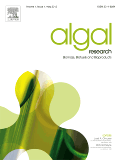
Algal Research-Biomass Biofuels and Bioproducts
Innovating biofuels through algal biotechnology.Algal Research - Biomass Biofuels and Bioproducts is a prestigious academic journal published by Elsevier, dedicated to advancing the field of algal biotechnology and its applications in biomass, biofuels, and bioproducts. With an ISSN of 2211-9264 and a notable impact factor, this journal is recognized as a leading source of innovative research, boasting a current Scopus rank of #31 out of 406 in the domain of Agricultural and Biological Sciences, specifically Agronomy and Crop Science, positioning it in the top 8% of its field (92nd percentile). This open-access publication, established in 2012 and covering literature up to 2024, prioritizes disseminating high-quality research that fosters sustainable solutions for energy and bioproducts derived from algal resources. As a Q1 ranked journal in the 2023 Agronomy and Crop Science category, it serves as a vital resource for researchers, professionals, and students seeking to understand and leverage the potential of algae within the biodiverse framework of bioeconomy and sustainable practices.

APPLIED BIOCHEMISTRY AND BIOTECHNOLOGY
Driving Discoveries in Applied Microbiology and BeyondApplied Biochemistry and Biotechnology is a leading journal published by Springer, dedicated to advancing research in the interdisciplinary fields of biochemistry, biotechnology, and applied microbiology. Established in 1981, this peer-reviewed journal covers a wide range of topics that encompass innovative techniques, methodologies, and applications of biochemistry and biotechnology in medicine, environmental engineering, and molecular biology. With a Q2 ranking in several categories and an increasing impact factor, the journal demonstrates significant influence and credibility within the scientific community. While traditionally subscription-based, the journal offers avenues for open access through selective agreements, making high-quality research accessible to a broader audience. Researchers, professionals, and students alike will find Applied Biochemistry and Biotechnology to be an invaluable resource for the latest developments and applications in biochemistry and its related fields, aiding in the quest for sustainable solutions and novel biotechnological advancements.
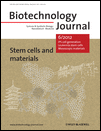
Biotechnology Journal
Exploring the nexus of microbiology and molecular medicine.Biotechnology Journal, published by WILEY-V C H VERLAG GMBH, stands at the forefront of biotechnological research and innovation, recognized for its significant contributions to the fields of applied microbiology, molecular medicine, and broader biotechnology. With its ISSN 1860-6768 and E-ISSN 1860-7314, this journal has achieved impressive 2023 quartile rankings, positioning itself in Q1 for both Applied Microbiology and Biotechnology and Medicine (miscellaneous), and Q2 in Molecular Medicine, showcasing its impact and relevance within the scientific community. Based in Germany, the journal aims to disseminate high-quality research that drives advancements in biotechnological applications, fostering a platform for researchers, professionals, and students to engage with cutting-edge developments. With its ongoing commitment to excellence, the Biotechnology Journal is an essential resource for those seeking to stay informed about the latest trends and innovations in biotechnology.
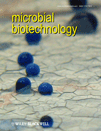
Microbial Biotechnology
Championing open access to transformative microbial research.Microbial Biotechnology, published by WILEY, stands at the forefront of innovation in the field of applied microbiology and biotechnology, showcasing cutting-edge research and advancements within both academic and industrial contexts. As an Open Access journal since 2012, it ensures that high-quality research is easily accessible to researchers, professionals, and students globally, promoting knowledge sharing and collaboration. With an impressive impact, the journal holds a Q1 ranking in its categories—Applied Microbiology and Biotechnology, Biochemistry, Bioengineering, and Biotechnology—demonstrating its significance in the scientific community. The journal currently boasts a strong Scopus ranking in several relevant disciplines, including a top 10% position in Applied Microbiology and Biotechnology, highlighting its critical role in disseminating influential findings. Designed to foster dialogue and advance technology within the microbial sciences, Microbial Biotechnology is an essential resource for anyone committed to leveraging microbial processes for sustainable and innovative solutions.